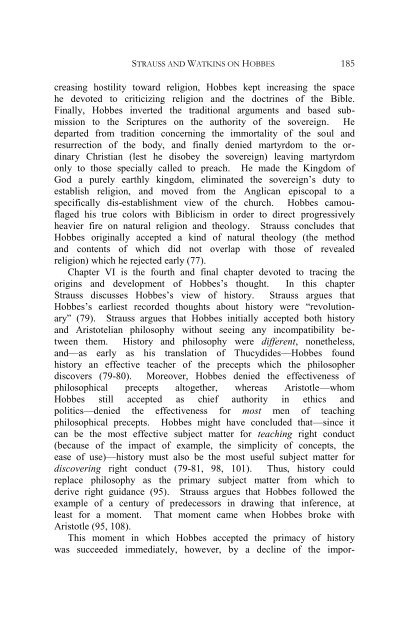Strauss and Watkins on Hobbes' Political Philosophy: A Review
Strauss and Watkins on Hobbes' Political Philosophy: A Review
Strauss and Watkins on Hobbes' Political Philosophy: A Review
You also want an ePaper? Increase the reach of your titles
YUMPU automatically turns print PDFs into web optimized ePapers that Google loves.
STRAUSS AND WATKINS ON HOBBES 185<br />
creasing hostility toward religi<strong>on</strong>, Hobbes kept increasing the space<br />
he devoted to criticizing religi<strong>on</strong> <str<strong>on</strong>g>and</str<strong>on</strong>g> the doctrines of the Bible.<br />
Finally, Hobbes inverted the traditi<strong>on</strong>al arguments <str<strong>on</strong>g>and</str<strong>on</strong>g> based sub-<br />
missi<strong>on</strong> to the Scriptures <strong>on</strong> the authority of the sovereign. He<br />
departed from traditi<strong>on</strong> c<strong>on</strong>cerning the immortality of the soul <str<strong>on</strong>g>and</str<strong>on</strong>g><br />
resurrecti<strong>on</strong> of the body, <str<strong>on</strong>g>and</str<strong>on</strong>g> finally denied martyrdom to the or-<br />
dinary Christian (lest he disobey the sovereign) leaving martyrdom<br />
<strong>on</strong>ly to those specially called to preach. He made the Kingdom of<br />
God a purely earthly kingdom, eliminated the sovereign’s duty to<br />
establish religi<strong>on</strong>, <str<strong>on</strong>g>and</str<strong>on</strong>g> moved from the Anglican episcopal to a<br />
specifically dis-establishment view of the church. Hobbes camou-<br />
flaged his true colors with Biblicism in order to direct progressively<br />
heavier fire <strong>on</strong> natural religi<strong>on</strong> <str<strong>on</strong>g>and</str<strong>on</strong>g> theology. <str<strong>on</strong>g>Strauss</str<strong>on</strong>g> c<strong>on</strong>cludes that<br />
Hobbes originally accepted a kind of natural theology (the method<br />
<str<strong>on</strong>g>and</str<strong>on</strong>g> c<strong>on</strong>tents of which did not overlap with those of revealed<br />
religi<strong>on</strong>) which he rejected early (77).<br />
Chapter VI is the fourth <str<strong>on</strong>g>and</str<strong>on</strong>g> final chapter devoted to tracing the<br />
origins <str<strong>on</strong>g>and</str<strong>on</strong>g> development of Hobbes’s thought. In this chapter<br />
<str<strong>on</strong>g>Strauss</str<strong>on</strong>g> discusses Hobbes’s view of history. <str<strong>on</strong>g>Strauss</str<strong>on</strong>g> argues that<br />
Hobbes’s earliest recorded thoughts about history were “revoluti<strong>on</strong>-<br />
ary” (79). <str<strong>on</strong>g>Strauss</str<strong>on</strong>g> argues that Hobbes initially accepted both history<br />
<str<strong>on</strong>g>and</str<strong>on</strong>g> Aristotelian philosophy without seeing any incompatibility be-<br />
tween them. History <str<strong>on</strong>g>and</str<strong>on</strong>g> philosophy were different, n<strong>on</strong>etheless,<br />
<str<strong>on</strong>g>and</str<strong>on</strong>g>—as early as his translati<strong>on</strong> of Thucydides—Hobbes found<br />
history an effective teacher of the precepts which the philosopher<br />
discovers (79-80). Moreover, Hobbes denied the effectiveness of<br />
philosophical precepts altogether, whereas Aristotle—whom<br />
Hobbes still accepted as chief authority in ethics <str<strong>on</strong>g>and</str<strong>on</strong>g><br />
politics—denied the effectiveness for most men of teaching<br />
philosophical precepts. Hobbes might have c<strong>on</strong>cluded that—since it<br />
can be the most effective subject matter for teaching right c<strong>on</strong>duct<br />
(because of the impact of example, the simplicity of c<strong>on</strong>cepts, the<br />
ease of use)—history must also be the most useful subject matter for<br />
discovering right c<strong>on</strong>duct (79-81, 98, 101). Thus, history could<br />
replace philosophy as the primary subject matter from which to<br />
derive right guidance (95). <str<strong>on</strong>g>Strauss</str<strong>on</strong>g> argues that Hobbes followed the<br />
example of a century of predecessors in drawing that inference, at<br />
least for a moment. That moment came when Hobbes broke with<br />
Aristotle (95, 108).<br />
This moment in which Hobbes accepted the primacy of history<br />
was succeeded immediately, however, by a decline of the impor-
















